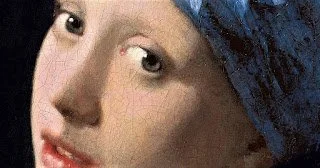Don Pesci: What is a woman?
Detail from Johannes Vermeer’s (1632-1675) “Portrait of a Woman With a Pearl Earring’’
VERNON
The absurdities of post-modern life press upon us like some finely tuned, automatically updated incubus.
Awaiting approval for her nomination to be on the U.S. Supreme Court, current Associate Supreme Court Justice Ketanji Brown Jackson was asked, by a woman legislator, as it happened, to “define a woman.”
She demurred, modestly pleading that she was no biological scientist.
But the question, not entirely innocently presented, begs to be answered. When I put the question to two politically unbiased women, both agreed that a “woman” may be defined as one who receives flowers from a male admirer.
I cannot remember ever having received a bouquet of flowers from a woman. I have given out a few bouquets of flowers to women I admire and cannot recall ever having sent a bouquet to a man.
So far, so good.
Naturally, there are exceptions, but exceptions generally prove the rule, except in rare cases when it becomes politically expedient to make a rule of an exception. This nearly always ends in disaster. Both rules and definitions should be generally accepted by what the ordinary run of humanity would regard as objective and dispassionate observers.
My grandfather – Carlo “The Fox” – stands out as an exception … sort of.
One day, when I was storming through my reckless teens, “The Old Man,” as everyone affectionately called Grandfather Carlo, showed up at the Pesci homestead clutching a fist full of Bennies, which he pressed upon his daughter Rose, my mother.
This took her, the immediate family, the extended family and, for all I know, any relatives in Italy who knew Carlo well, by surprise. Carlo The Fox was abstemious when it came to money, not exactly a Scrooge, but close.
“What’s this for?” my mother asked.
Sitting by the kitchen window, the early morning sun bathing his weather ravaged face, he explain that he was old.
My mother nodded assent, a question mark mysteriously appearing on her forehead.
He sipped his “coffee royal” -- steaming hot black coffee, just short of an espresso, never to be diluted with anisette -- while his daughter waited patiently for him to explain why on this day he had abandoned a lifetime of penny-pinching. To be sure, he had in the past made rare exceptions to his inflexible habit, most often when he was engaged in card games for money, not sport. In one game, he had won, and then lost a portion of Elm Street in Windsor Locks, Conn.
My mother groaned when she discovered this. “We could have been rich,” she observed.
Rose waited him out. And, sipping his coffee, to which was added a knuckle of Jack Daniels, it came bubbling out of him like a freshet of living water.
He did not expect to live too many years longer, most of his friends were dead, he could not – dare not! – trust anyone with the mission he assigned my mother. When he died – unfortunately the fate of all men, rich, poor and moderately well-off – she was to take the money and with it buy flowers for his wake and funeral. He did not want to go out un-flowered or unrespected by the few of his friends who might survive him.
My mother, who had gotten used to her father’s abstemiousness -- though he had made an exception in the case of coffee-royals and Italico Classico Ammezzato cigars, a refined blend of Italian and Kentucky, he was pleased to note -- was touched and instantly accepted the commission. When Carlo The Fox died, his body was smothered in flowers.
So here was a woman buying flowers for a man – to be sure, with the man’s money – an exception that proves the rule.
Few of us are linguistic scientists or professors of grammar, morphology, syntax, phonology, phonetics, and semantics. We are not Noam Chomsky, a reliable guide when he does not meander outside his discipline. The definition of a woman as “one who receives flowers from an admiring gentleman” is serviceable and practical, allowing for arcane exceptions that, given the postmodern bad habit of redefining foundational characteristics, does not touch embarrassing and painful questions such as “Should elementary school libraries stock Gender Queer and Lawn Boy?”
Don Pesci is a Vernon-based columnist.
Toll bridge over the Connecticut River, c. 1910.

